Sharing Genealogy Information
Free Genealogy Translation Services
July 2, 2012 by ramona
Filed under Articles, Genealogy Research Resources, Latest News, Sharing Genealogy Information
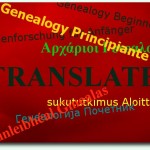 If your ancestors are from Europe, Asia, Russia, South America or another non-English speaking region; you are probably among countless other family tree researchers who will eventually need help translating your genealogy documents.
If your ancestors are from Europe, Asia, Russia, South America or another non-English speaking region; you are probably among countless other family tree researchers who will eventually need help translating your genealogy documents.
Although free online translators have become an abundant resource on the net, when it comes to archaic words, idioms or technical terms they may fall short of expectation.
Live translation services can be costly however; there are some wonderful folks out there who offer genealogy translation services free of charge.
- Linguanaut. Is a site with access to 150 translators, their goal is to connect people in need of a translation with a volunteer translator. To get started just click on Free Translation then choose your language and they will match you up with a translator. (Short non-commercial translations only).
- Freelang: is a fantastic resource with hundreds of volunteers that offers free “short” translations for non-commercial reasons.
To use their service all you need to do is:
- select a language
- select a translator
- fill out their contact form
Your translator will contact you via email with your translation.
- Cucumis: is based on the exchange of services for the benefit of all. This service works on a point system, for example; you can earn points by translating something for another member. However, even if you only speak one language you can still earn points simply by signing up
- WikiTranslation. This site is the simplest to use. All you need to do is fill out their translation request form and someone should get back to you via email.
Of course, there are other language specific services available as well and a quick Google search should give you a list of sites in no time. Happy ancestor hunting.
The Lost Irish: FREE Searchable Database
June 30, 2012 by ramona
Filed under Articles, Genealogy Research Resources, Latest News, Sharing Genealogy Information
 During the nineteenth and early twentieth century, Irish immigrants flocked to North America in droves. Leaving their homeland, due to poverty, political upheaval and famine; or simply to begin anew, they came in hopes of finding a better life.
During the nineteenth and early twentieth century, Irish immigrants flocked to North America in droves. Leaving their homeland, due to poverty, political upheaval and famine; or simply to begin anew, they came in hopes of finding a better life.
Leaving family and friends behind, their only mode of communication with loved ones was by letter. However, the international postal system was just developing and many immigrants lost touch with the folk back home. As a result, many new immigrants were lost to their relatives who remained in Ireland.
Missing Friends
October 1831 marked the birth of a new feature in the Boston Pilot newspaper when an advertisement seeking a Patrick McDermott and his family was published. This advertisement began what later became known as the “Missing Friends” column. The column was an instant success, increasing the newspapers circulation both at home and on an international scale.
A Family Tree Resource
Lasting an amazing ninety years the column ran from 1831 to 1921 and helped countless people find those they had lost. For family history buffs this translates into an amazing FREE resource for finding Irish ancestors. This genealogical treasure contains 40,268 records with text for every advertisement that was placed in the paper.
While the information included varies, it is possible to find some informative facts such as:
- county and parish of birth
- date they left Ireland
- expected port of arrival
- occupation
Using the Database
Although the database has a simple search, the advanced search function allows a great deal of flexibility.
MISSING PERSON’S INFORMATION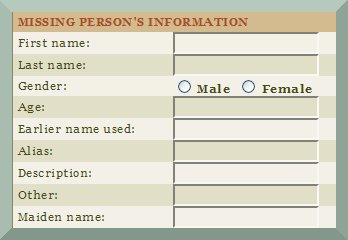 |
Using this search box, I entered the name Patrick O’Brian that returned 452 results. The information returned included:Home County: CorkTownland: Ballydunigan Nr. Bear HavenDeparture date: 1859Port of Departure: England, Liverpool Port of Arrival: MA, Boston |
| Additionally there was a description of the ad placed for him:Any Info Alive Or Dead. Other: Last May (05/65) He Resided W/His Si = Margaret O Brien For About A Mo.; He + His Br. = Denis Started To Mi, Lake Superior + Lived W/Fa + Mo For 6 Yrs; He Got M. About 2 Yrs Ago; Came To Visit His Mo. A Yr Ago Last 4-Jul To Mn Coppermines, Antaugon Co. | |
SEEKING PERSON’S INFORMATION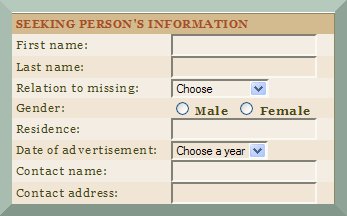 |
The above search also returned the data for the person seeking Mr. O’Brien.Name: Catherine O BrienRelation to missing: MotherGender: FemaleResidence: OH, Youngstown, Mahoning CountyDate of advertisement:08-25-1866 |
POINT OF ORIGIN INFORMATION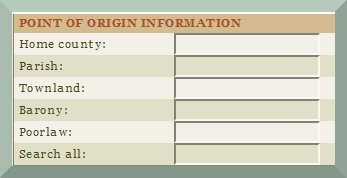 |
The advanced search also lets you search for a person by point of origin.For this search, I used Dublin as my point of origin, which only returned five results. |
WORK HISTORY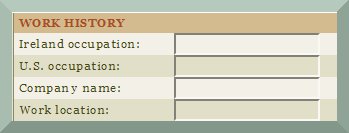 |
If you know your ancestors trade, searching by occupation can give you a wide field of reference.I tried looking for:
|
LOCATION AFTER ARRIVAL |
As many American immigrants first came to North America through Canadian ports, I tried a search for Nova Scotia (A common port of entry for many U.S. immigrants). This search returned 26 results. Under the results was listed Patrick O Donnell, a Shoemaker who after arriving in Nova Scotia travelled to Mo, St. Louis (1859) and ended up in LA, New Orleans |
| The description for Mr. O Donnell reads.M. in Nova Scotia, Halifax (1857); His Wi. = Bridget O Donnell (Borve) in Canada, Quebec Is Anxious To Hear Some Tidings Of Him. Other: Last Heard He Worked at His Trade in LA, New Orleans; At The Time He Left Ns, Halifax He Had A Npw. = John A. Hearns Studying at The Seminary Of Carondolet Nr. Mo, St. Louis | |
TRAVEL INFORMATION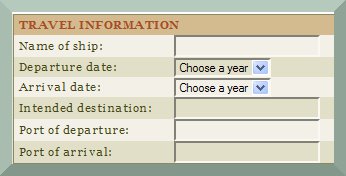 |
Searching by travel information allows you to simply select a year or the intended destination; very handy for researchers who are working with limited information. |
Key Word Search |
The last search field allows you to do a search of the entire database. You can search by name or by keyword. This is very handy should you have an ancestor with an alias or nickname.For example, a search under “Bessy” (short for Elizabeth) returned 55 results including the information for Elizabeth Daily AKA Bessy Daily. |
If you are ready to start searching for your missing ancestor, Boston College searchable database can be found at http://infowanted.bc.edu/.
Before you head off remember to get your Genealogy Beginner family tree charts and research tracking forms available with your 30-day free trial.
Black Sheep Ancestors
May 11, 2012 by ramona
Filed under Articles, Genealogy Research Resources, Latest News, Sharing Genealogy Information
 Pirates, Outlaws and Ne’er do wells; it would be uncommon to research any family tree without finding at least one skeleton in the closet.
Pirates, Outlaws and Ne’er do wells; it would be uncommon to research any family tree without finding at least one skeleton in the closet.
Ancestors with a criminal record can range from unfortunate debtors who paid a price for being poor to thieves and pickpockets or even those executed for murder. Although none of us wants to find we descended from a cold-blooded killer, having a rogue in the family tree does add a little excitement.
Throughout history there have been criminals and alongside them court systems and institutions for dealing with them. With prisons and courts come the records they generate and those records are a wonderful resource for genealogists and family historians looking for a missing ancestor.
Information found in court and prison records can include the accused or inmate’s next of kin, name and age. Whether or not they could read, their trade, the reason they were in trouble and the sentence they received for their crime.
Finding Criminals Past
Blacksheep Ancestors is a free genealogy site filled with prison lists and court records that encompass Great Britain, Canada and the US.
One fantastic and free searchable list is The Proceedings of the Old Bailey, 1674-1913, which has a fully searchable database that contains 197,745 criminal trials from London’s central criminal court.
The site also has links to the biographies of petty and master criminals alike where you can read the stories about:
- Catherine Hayes, who in 1725 conspired with her lovers to kill her husband and was tried, convicted and executed for her crime.
- The Fourth Earl Shirley, Laurence Ferrers, who was the last peer of the realm convicted as a common criminal and hanged
- Eliza Fenning, a young cook who was found guilty of the attempted murder of her employers by poisoning their food. Up until the moment Eliza was put to death, she claimed her innocence.
Whether you have an ancestor who was a minor miscreant or someone with an infamous criminal past, Blacksheep Ancestors is a fascinating genealogy website dedicated to helping you trace the romantic rogues and villainous scoundrels in your ancestral line. Share your Black sheep story on Genealogy in General.
Find Your Ancestors in Almanacs
April 1, 2012 by ramona
Filed under Articles, Genealogy Research Resources, Latest News, Sharing Genealogy Information
 Almanacs can be a great resource for genealogists and family historians. Along with weather predictions, advice for farmers and statistical information almanacs can contain tit bits of information about your ancestors that are not found in vital events documents or census. Additionally almanacs can give wonderful ephemeral information to round out your family history story and fill in your family template. Gutenberg printed the very first almanac in 1457 in Mentz, Germany and their use spread to almost every country by the 1600s. By the 1800s, it was possible to find yearly almanacs for nearly every county in Great Britain.
Almanacs can be a great resource for genealogists and family historians. Along with weather predictions, advice for farmers and statistical information almanacs can contain tit bits of information about your ancestors that are not found in vital events documents or census. Additionally almanacs can give wonderful ephemeral information to round out your family history story and fill in your family template. Gutenberg printed the very first almanac in 1457 in Mentz, Germany and their use spread to almost every country by the 1600s. By the 1800s, it was possible to find yearly almanacs for nearly every county in Great Britain.
The best way to demonstrate what a great resource an almanac can be is by looking in one for information. For this purpose “Peace’s Orkney Almanac and County Directory, 1886” gives us a great example of genealogical and family history information that.
The Family History Element
Within the front and back pages of the almanac, there is a wide range of advertisements that present a window into your ancestor’s daily lives.
From these advertising pages, we get a glimpse at the fashions of the times, modes of travel, an idea of how they may have approached emigrating to a new land and even some insight into daily chores.

Almanacs and Genealogy
An almanac contains a wealth of information in the trades sections. From listings of “Inspectors of the Poor” to a list of “Registrars of Births, Marriages and Deaths” that can be very helpful in pinpointing those questionable dates. Looking at this entry, we can see the timelines given to register any vital events.

Almanacs can also be used to help you find resources for records. Peaces Orkney and Shetland Almanac names all of the churches, clergy, schools and teachers in the county. It also gives the names of newspapers that were published at the time along with groups, society’s guilds and clubs, which are all fantastic sources of information for family tree research.
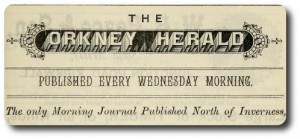
Additionally, it is common for almanacs to break up the directory listings by parish where you may find information that is more specific to your ancestor. Flipping to the directory for Sanday we find out that Peter Sinclair is listed as a member of the Parochial Board as well as a member of the School Board, which suggests he was an active member of his community. Not information found in a census, in fact almanacs are probably the number one place to look if you are searching for clues about your ancestors between census years.
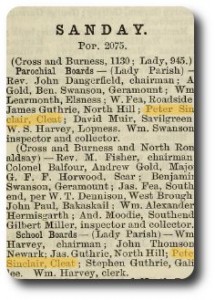
In this particular issue, we get lucky, as there is register of voters that not only lists the men but also gives a list of female municipal electors that predates women being given the right to vote in Great Britain. Looking at an almanac for genealogy can not only help locate ancestors and resources, it can also teach a few things that we may not learn from history books; such as areas where reform was more progressive. The pictures and stories of an almanac are one of those often forgotten information sources that can paint a surprisingly vivid picture of your family tree.
Image Credits: Ramona Hartley, Peaces Orkney Almanac and County Directory
Source: Internet Archives, National Library of Scotland
Rights: National Library of Scotland holds full rights in this digital resource and agrees to license the resource under the Creative Commons License: Attribution-Noncommercial-Share Alike 2.5 UK: Scotland.
Creative Commons license: Attribution-Noncommercial-Share Alike 2.5 UK: Scotland
Licenseurl: http://creativecommons.org/licenses/by-nc-sa/2.5/scotland/
Genealogy & Newspapers: Obituaries
March 25, 2012 by ramona
Filed under Articles, Genealogy Research Resources, Latest News, Sharing Genealogy Information
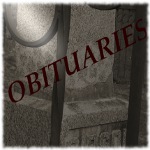
One single record may tell you more about your ancestor than a death, marriage and birth certificate combined and that is their obituary. Obituaries can provide information about your ancestor that cannot be found in civil and church records and that makes them one of the best sources of genealogical information available. Before death certificates were even required obituaries had already long existed.
The Value of Obituaries to Genealogical Research
Even when you have already obtained all of the official records for your ancestors, an obituary can help fill in the gaps between years. Obituaries frequently impart valuable information about events that happened in the years between birth, marriage, the census returns and death.
For example, an obituary can identify children you may have missed. Often when we look at a timeline of our ancestor’s childbearing year’s we see that births occur in a pattern. Such is the case with my ancestors Peter Sinclair and Catherine Calder.
Children of Peter Sinclair and Catherine Calder m. 1854:
- James Sinclair b. 1855
- Isabella (Bella) Sinclair b.1857
- Catherine Drever Sinclair b. 1859
- Richard Sinclair b.1861
- William Sinclair b.1862
- Jean Sinclair b.1867
- Peter Sinclair b.1870
- Robert Sinclair b.1874
You can see by the example that from their first child to their fifth child there was two years between births. Then the pattern breaks with a five-year gap between the fifth and sixth child, a three-year gap between the sixth and seventh child and a four-year gap between the last two.
Gaps like this indicate the possible loss of a child. If you find gaps such as this that lie between census years and no record of birth or death has been found, an obituary is the logical place to look.
Your Ancestors Obituary
Here is a quick look at some of the other information that can be found in an obituary.
- Dates of birth, marriage and death
- Place of birth, marriage and death
- Name of parents and grandparents
- Number of children and grandchildren
- Names of children and grandchildren
- Residences and Occupations
- Memberships to clubs or societies
- Religion and church attended
- Military Service information
- Cause of death
Where to Find Obituaries for Your Family Tree
When you think of obituaries, the primary resource that comes to mind is newspapers. That is certainly a logical conclusion, the next questions are where to find the newspapers and if you are researching from a distance how to access them.
A great source for this information is online obituary indexes. Obituary indexes such as the Library of congress’s “Chronicling of America” provides searchable, free, online access to a huge database of newspapers from 1836 – 1922. If the newspaper you are looking for were not accessible online your next strategy would be to locate an obituary look-up or mailing list.
Although newspapers are recognizably the main source of obituaries, they are only half the story. Obituaries and obituary indexes can also be found in published journals, such as the “Obituaries Index Prior to 1800 by Sir William Musgrave” an index to the obituaries of “memorable persons” of England, Scotland and Ireland. This publication and others like it hold a treasure trove of ancestral information that may point out obituaries published in books, university papers, magazines and memoirs. All great sources that get you closer to adding another generation to your family template.
If you have any tips to share on researching obituaries or any questions about this wonderful source of ancestral information, join us on the Genealogy in General forum.
Image Credit: Ramona Hartley
Genealogy Webinars for Genealogy Beginners
February 19, 2012 by ramona
Filed under Articles, Genealogy Research Resources, Latest News, Sharing Genealogy Information
Genealogy we binars are becoming a popular way to stay up to date with the latest genealogy news and events. They are also a great resource for genealogy beginners to learn some new research tricks and tips.
binars are becoming a popular way to stay up to date with the latest genealogy news and events. They are also a great resource for genealogy beginners to learn some new research tricks and tips.
A genealogy webinar is a live interactive class, lecture or interview that is broadcast at a scheduled time over the internet. They can be a great way to hear about new developments and family tree resources or just to hear expert genealogists give a lecture on your favorite genealogy subjects.
While some genealogy webinars are free, some have a nominal fee. However, it is a good deal less expensive than travelling to a family history workshop and paying to hear the lecture live.
How Do Genealogy Webinars Work?
A lot goes into producing a good genealogy webinar.
Usually they are:
- Produced by a sponsor (generally the organizer of the webinar)
- Presented by a host who introduces the key speakers or guests and screens calls
- Attended by genealogy novices, hobbyists and professionals from their homes via computer
How Do I Attend A Genealogy Webinar?
Attending a genealogy webinar is simple; all you need is a computer with a high-speed internet connection and speakers. If you want to ask questions, a USB headset is recommended however, you can use a telephone. Most importantly, you will need to preregister, as you may have to download software to participate. Downloading the software is quick, free, and anti virus protection is included. It really is very easy and instructions for download are given when you preregister.
How Do I Find Genealogy Webinars?
You can find genealogy webinars in many places on the internet. Nevertheless, Genealogy Beginner has found that the best resource is at Genea Webinars blog. One of the reasons we think they are so wonderful is for their calendar of upcoming webinars. Another reason they are a favorite is that they have an archive of webinars. So, if you missed one you can still access it for ten days after it airs. This is perfect if you have a schedule conflict. One of the biggest reasons we love Genea Webinars is because most archived webinars are free.
Here is a sneak peek into some of Gena Webinars upcoming shows:
- Are You Ready for the 1940 U.S. Census Images with Thomas MacEntee, March 7
- The Pursuit from Genealogy Hobbyist to Professional with John Kitzmiller and Claire Brison-Banks, April 4.
- Reverse Genealogy: Finding the Living with Megan Smolenyak, April 25.
- DNA Research for Genealogists: Beyond the Basics with Ugo Perego. March 21.
- What is a ‘Reasonably Exhaustive Search’? with Michael Hait. September 12.
Genealogy Beginners Top Three Picks for Archived Webinars:
- Digital Books and Sites for Genealogists
- The Power of DNA in Unlocking Family Relationships
- Organize, Share, and Publish Your Digital Photos with Heritage Collector Suite
Genealogy Webinars are a good resource for genealogists no matter what your level of experience. If you are planning to attend a webinar for the first time and you need to learn a little more, join us on the Discovery Panel forums, where you will also find a link to Genea Webinars calendar and archives.
Image Credit: Roundpegbiz via Photobucket
Genealogy TV Favorites
February 14, 2012 by ramona
Filed under Articles, Genealogy Research Resources, General Tips, Latest News, Sharing Genealogy Information
 With the new season of NBC’s Who Do You Think You Are now regularly scheduled for Friday nights 7/8c and the BBC program Finding Your Roots set to air on March 25, it may seem that genealogy addicts would be getting their family history fix.
With the new season of NBC’s Who Do You Think You Are now regularly scheduled for Friday nights 7/8c and the BBC program Finding Your Roots set to air on March 25, it may seem that genealogy addicts would be getting their family history fix.
However, if you just cannot get enough, there are a number of excellent programs that will help tide you over. Some of them may be your old favorites, while you can enjoy others as new-to-you.
Genealogy TV Timeline
Genealogy TV may have gained fame with the Who Do You Think You Are franchise but it was not the first of its kind. From genealogy TV’s beginnings genealogy beginner plots a timeline of genealogy viewing pleasure.
History Detectives – PBS: Premier 2003
History Detectives a PBS documentary series had a unique approach to genealogy. The show centered on solving the mysteries of family heirlooms and historic objects through family history and genealogy.
Who Do You Think You Are – BBC: Premier 2004
The first of the WDYTYA franchise began with the British version and was a huge success right from the start. Expanding to produce shows for Canadian (2007), Australian (2008), Irish (2008) and US (2010) audiences, it is still going strong.
Ancestors in the Attic – History Channel: Premier 2006
History Channel had its contribution to Family Tree broadcasting with the unforgettable Canadian program Ancestors in the Attic. The premise of this series follows a team of genealogists as they use traditional research techniques combined with genealogy DNA research to present an entertaining picture of genealogist as detectives.
Coming Home – BBC: Premier 2007
Coming home is a charming program that focuses on Welsh genealogy. Produced by BBC Wales it follows a similar format to Who Do You Think You Are. Each episode features a celebrity in search of their Welsh roots.
The Genealogy Roadshow – RTE One: Premier 2011
A four part Irish Genealogy TV series airs on RTE One. This program follows a fun format much like Antiques Roadshow. The Ancestor hunters of the Genealogy Road Show travel Ireland solving family history mysteries.
Faces of America – PBS: Premier 2010
Faces of America the four part series hosted by professor Henry Louis Gates is another enjoyable PBS program. Faces of America combines DNA testing with genealogy research to delve into the family trees of celebrities.
The great news is that you do not have to wait a week to watch more genealogy TV as episodes of for these must watch shows are available now…online free. Join us on the Coffee Shop Forum for links.
Image Credit: FrankAllan via Photobucket
MOCAVO: The Search Engine for Genealogy
February 9, 2012 by ramona
Filed under Articles, Genealogy Research Resources, Latest News, Sharing Genealogy Information
 Mocavo is turning out to be big news for genealogy. This FREE genealogy specific search engine was launched last spring and has been growing rapidly ever since. Now, with Ryan Hunter a former Wall Street Analyst at the helm and well-known genealogist Michael Leclerc coming on board, the future of Mocavo looks bright indeed.
Mocavo is turning out to be big news for genealogy. This FREE genealogy specific search engine was launched last spring and has been growing rapidly ever since. Now, with Ryan Hunter a former Wall Street Analyst at the helm and well-known genealogist Michael Leclerc coming on board, the future of Mocavo looks bright indeed.
Mocavo offers an index of over four billion names and is reported to be the fasted search engine in the industry.
Mocavo for Genealogy
If you ask Mocavo how they measure up to Google, they will tell you that Google only indexes five percent of the webs genealogy content. This leaves millions of pages of family tree research information with no way to be searched. Mocavo is on a mission to “make searchable and index” ALL free genealogy information on the internet.
Thus far, Mocavo includes National Archives, Ellis Island, Library of Congress and Find a Grave to mention just a few. Additionally, Mocavo will lead you to an extensive list of Family Trees and individual genealogy sites. While a Mocavo basic search is free an upgrade to Mocavo Plus will increase your search power.
Some of the features of the Mocavo Plus upgrade include:
Wild Card Search
If you are working off an old document and can only make out part of the name, just enter that and Mocavo will return a list of possible hits
First Name Alternatives
Just enter Liz and get returns for Lizzy, Elizabeth, Betty, actually any nickname alternative.
Sounds Like
We all have run across the many different spellings possible for an ancestor’s name. With Mocavo just enter the name as you know it. For instance, entering Abuda will return several combinations such as Habuda, Habood, Aboud etc. It saves from having to run a search for each.
These features along with several more, allow genealogist to conduct smart searches that save a lot of time. Of course, there is a fee for Mocavo Plus membership but you can opt in for a yearly membership or just go month to month at a reasonable price.
Once a member you will also have access to tools for publishing your own Family Tree that will let you share and collaborate with others.
If you have already tried Mocavo, Genealogy Beginner would love to hear about it. Join us on the Genealogy in General Forum and share your thoughts with other Genealogy Beginners.
Image Credit: esutera via Photobucket
Genealogy Journeys and Heritage Vacations
January 6, 2012 by ramona
Filed under Genealogy Research Resources, Latest News, Sharing Genealogy Information
 Who said time travel was not possible?
Who said time travel was not possible?
A vacation to explore your ancestral roots is an exciting trend and “destination past” is catching on in a big way. Modern genealogy buffs are setting off for – far off distant shores – by the dozens and there is no shortage of options from which to choose.
Whether you are the type who prefers to plan your own travel, someone who would rather sign up for an all-inclusive package or a social soul with a preference for a Family Tree Tour, you are sure to find what you are looking for.
Just look to the numerous travel organizations specializing in genealogy vacations for help, they will be more than happy to offer their assistance.
- Family Tree Tours has just released their line up of 2012 tours with five fantastic destinations.
- European Focus allows you to set your own schedule and destination. They take care of the travel details, including making advanced contact with pastors, archivists and local historians.
Maybe you have a precise destination in mind. No worries, you can book your trip from among a number of country or county-specific family tree travel companies across the globe.
Family Tree in a Suitcase
Have you plotted a course for your heritage adventure? If you have, it is essential to spend some time planning in order to make the most of your trip, particularly if you are going to travel independently.
Once you have decided on the type of trip you want to take, it is time to assess what you need to accomplish. Here are some things to think about… just to get you started.
Preparing for your Genealogy Journey:
- Have you decided what branch of your family or ancestor to focus on?
- Are you familiar with your destinations record sources?
- Have you checked out the official web page(s) for your destination?
- Do you know and have you recorded the contact information for:
- county courthouses
- libraries
- record repositories
What about the churches or cemeteries you wish to visit, do you know their hours?
There is always much to do in preparation for any kind of travel; however combining a vacation with genealogy research takes a little extra consideration. Do not get caught without needed research tools so far from home.
Join us on the forums: Genealogy News and Events for your Genealogy Journey Planner and list of Family Tree travel essentials.
Image credit: Suzann_04 Via Photobucket
Rootschat
September 25, 2008 by Chris
Filed under Blank Family Tree, Genealogy Research Resources, Sharing Genealogy Information

Do your past generations hail from Scotland?
If they do, you will want to head straight over to the forums at Rootschat where there is a fantastic forum that will interest anyone doing Scottish research and it is so well organized that every county in Scotland has its own designated area.
Chris over at Scotland’s Greatest Story tells us that you can also find threads for practicing your Gaelic (Scottish and Irish).
We wouldn’t want you to miss this great site as it has a lot to offer a genealogy beginner digging up their Scott’s roots.
There are also wonderful resources for those interested in English, Welsh, Manx, Channel Islands and Irish history,
For more on this subject visit: Scottish Genealogy News and Events.
